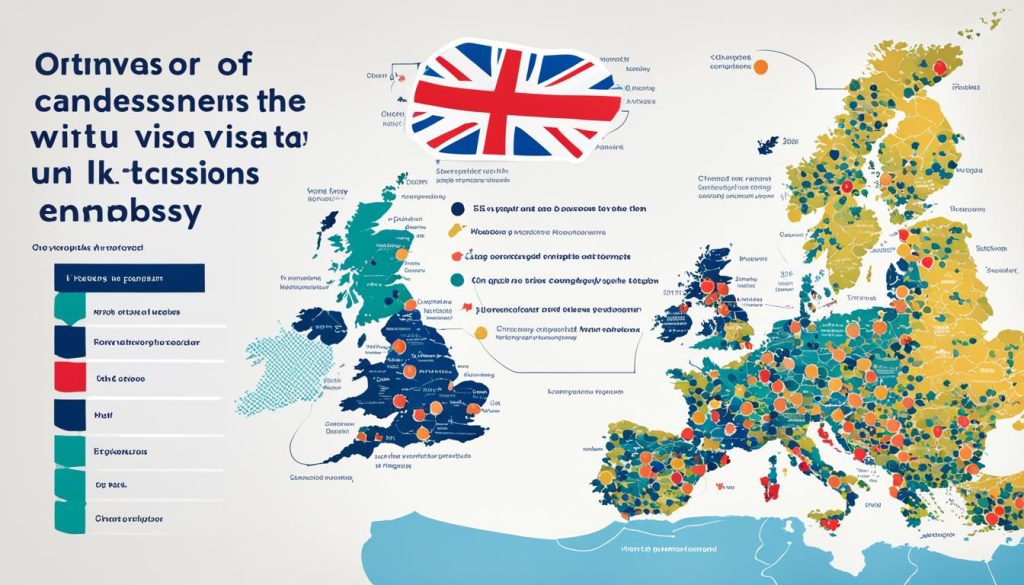If you want to explore the UK’s historical sites, its rugged landscapes, or its rich culture, knowing how to get in is key. Getting your head around the UK visa process might seem tough. But, this guide aims to make it simpler for you. We’ve got all the details you need to smoothly go through the UK’s immigration rules.
When planning your trip, knowing what visa you need is crucial. Whether you’re going for fun, work, or study, getting the right visa is possible. This guide is your go-to for all things related to getting a UK visa.
Understanding the UK Visa System
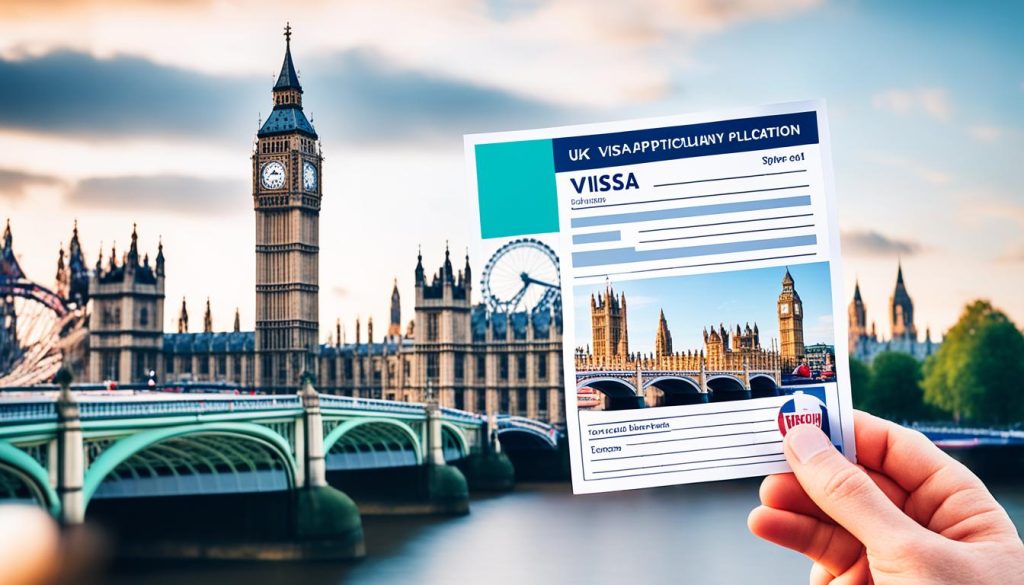
When you decide to visit the United Kingdom, understanding the UK visa system is crucial. You need to know about the different types of visas, how to apply, the costs involved, and how long it will take. The UK Visa and Immigration (UKVI) services make this easier for travellers and migrants. It’s important to know each step, whether you’re going on holiday, studying, working, or joining family.
Types of UK Visas
UK visas are designed for different needs and reasons. You can find visas for:
- Standard Visitor Visas for tourism or visiting relatives
- Study Visas for academic pursuits
- Work Visas for professional engagements
- Family Visas for joining relatives residing in the UK
- Innovator and Start-up Visas for business-minded individuals
Each visa type has its own requirements. This helps you plan your travel and stay in the UK.
The Application Process Explained
The first step in getting a visa is filling out an online form with your personal and travel details. Next, you need to gather and submit required documents. Then, you’ll have an appointment at a Visa Application Centre to give biometric information. Being ready for this process increases your chance of getting the visa you want.
Cost and Processing Timeframes
When applying for a visa, it’s important to think about the fees and how long the process will take:
- Visa Fees: Costs differ based on the type of visa and how long you’re staying. Prices go up for visas that allow longer stays.
- Application Timelines: It normally takes 3 weeks to decide on standard visitor visas. But, you can pay more to get it faster. Work or study visas take longer, so apply early to avoid travel issues.
Be patient and plan carefully. These steps are key to making sure you can enter the UK as planned.
Navigating the UK Visa Application

Starting the UK visa process might feel overwhelming, but don’t worry. With clear guidance, everything becomes simpler. Follow every step carefully to complete your online application. This will prepare you for your exciting trip ahead.
- Prepare the Necessary Documents: First, collect all needed documents. You’ll need your passport, place to stay, travel plans, and bank details.
- Complete the Online Visa Application: Use the UK Government’s website to apply. Make sure every detail is right to avoid mistakes.
- Book Your Visa Appointment: Submit your form, then book an appointment at a visa centre near you. Do this quickly as slots get filled fast.
- Attend Your Visa Appointment: On your appointment day, bring all documents and get ready for biometrics collection.
- Follow Up Post-Submission: After applying and attending your appointment, watch your application’s progress. Be prepared for any extra steps, like an interview.
Attention to detail can make a huge difference in your UK visa application. For bespoke advice, talk to experts or those who’ve applied before.
- Check your application carefully to avoid mistakes.
- Book your visa appointment early to secure a spot.
- Keep your documents organised for the visa centre appointment.
By being thorough with these steps, you can ease the UK visa process. This increases your chances of getting your visa approved.
Eligibility Criteria for a UK Visa

Planning a trip to the UK requires an understanding of visa and immigration rules. It’s key for a successful visa application. This includes short trips and long-term stays. The UK Visa and Immigration services have strict rules that depend on the visa type.
Standard Visitor Visa Requirements
If you want to tour, attend business meetings, or study short-term in the UK, you need a Standard Visitor Visa. To qualify, you must show:
- Proof of enough money for your stay,
- Evidence you have a place to stay and a ticket home,
- A plan of what you will do in the UK and that you will leave afterward.
Showing you have strong ties to your home, like a job or family, helps with your visa.
Eligibility for Long-Term Visas
For those planning to stay in the UK longer, several long-term visas are available. These are for work, study, or family reasons. They require:
- Being able to speak English well,
- A sponsorship or an offer from a UK entity,
- Enough money to support yourself without government help,
- Earning above a certain amount for your visa type.
Long-term visas have their own set of strict rules. A successful application means preparing well and knowing the law.
Documents Required for a UK Visa Application
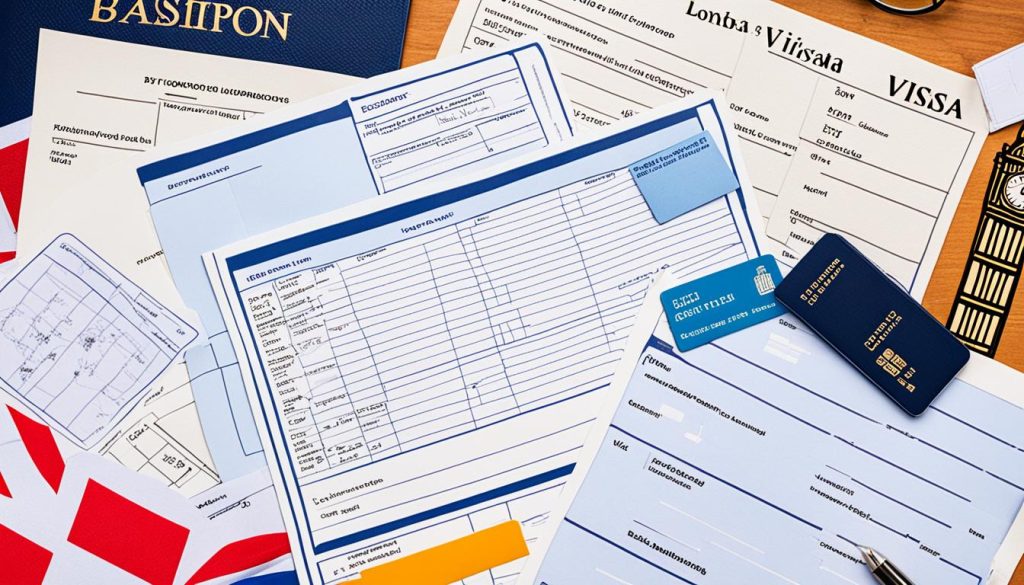
When preparing your UK visa application, you must verify your identity and provide strong financial proof. These documents are vital and are closely checked by immigration officers. They help determine if you are eligible and what your intentions are. Let’s look at the important documents you’ll need.
Proof of Identity and Nationality
First, you need to prove who you are for the visa. You must give various documents for this, including:
- Current passport or travel document, with at least one blank page for your visa,
- Previous passports to show where you’ve travelled,
- Two recent passport-sized colour photographs, compliant with UK visa photo requirements,
- Birth certificate or national ID card may also be needed to prove your nationality.
Make sure all documents are in your legal name. If they’re not in English or Welsh, they must be translated by certified translators.
Evidence of Financial Stability
You must show that you can support yourself in the UK without public funds. You need to provide evidence of your finances, which includes:
- Recent bank statements or payslips for steady income,
- Details of your stay and travel plans to show careful planning,
- Other financial assets like property deeds or investments.
Showing ties to your home country, like work, studies, or family, proves you plan to return. This is vital.
Prepare your visa documents early to make your application process smoother. Each document is important. They prove your identity, financial stability, and intention to visit the UK. Being diligent and detailed helps build a strong case for your visa.
Applying for a Tourist Visa to the UK
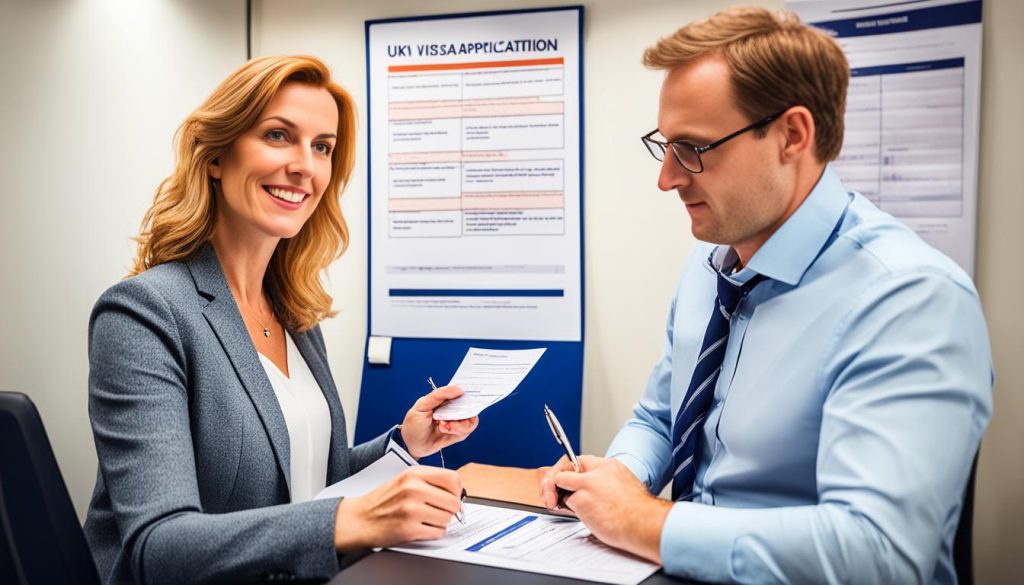
Want to see the UK’s history and and lively cities? Start with a UK tourist visa. It’s called the Standard Visitor Visa. It opens the door to the UK’s culture and history. For tourists, family visits, or fun, knowing how to apply and what rules to follow is key.
A strong application is essential. You need to show you’ll leave the UK after your visit. And that you can pay for your stay and any dependents. Let’s look at the steps you need to take:
- Fill in the online form with your details, trip plans, and where you’ll stay.
- Get the documents ready, like your passport and proof you have enough money.
- Book a meeting for your biometrics at a visa centre near you.
- Pay the fee for the visa and, if needed, for NHS healthcare during your visit.
You can usually stay for six months on a Standard Visitor Visa. This gives you lots of time to explore the UK. But, remember what you’re allowed to do. You can’t break the visa rules.
- Do tourist things, like seeing sights and visiting people.
- Take short courses, under 30 days.
- Go to business events. But no getting paid for work.
Also, think about travel rules that might affect your trip and visa application. Paying attention to details helps you get your visa. Ready to apply? The UK’s historical sites, green lands, and exciting cities are waiting for you.
Visa for the UK: Securing a Business Visa

Looking to explore new markets or invest in the UK’s economy? Businesspeople have specific visas just for them. The UK government offers these visas to help with business travel and investment. This is for entrepreneurs, investors, and corporate employees.
It’s important to know about the different visas, what you need for them, and their benefits. This knowledge makes applying easier. It lets business professionals focus more on their work than on visa issues.
Visas for Entrepreneurs and Investors
The UK invites business minds with the entrepreneur visa and investor visa. They suit those wanting to start or manage a business or invest a lot of money in the UK:
- The entrepreneur visa is for individuals with a strong business plan looking to boost the UK economy through a new or existing business.
- The investor visa is aimed at wealthy people ready to invest heavily in UK businesses.
These visas have tough criteria to meet. This ensures applicants are really going to help the UK’s business scene.
Corporate Visas for Employees
Corporate visas are here for companies expanding or moving staff to the UK. They cover company transfers, temporary workers, and those with rare skills needed in the UK:
- The Intra-company Transfer Visa suits multinational company employees moving to a UK branch.
- The Skilled Worker Visa lets UK companies hire international workers for skilled roles.
For a corporate visa, the UK company must sponsor the employee. This makes sure everyone follows the immigration rules for a smooth move.
Choosing the right UK business visa can really affect your success. With proper legal advice and knowledge of the rules, you can flourish in the UK’s booming business world.
The Points-Based Immigration System in the UK

Seeking work in the UK means understanding its points-based system. This approach checks if immigrants are eligible for a work visa. Knowing about work visa criteria and how important UK job offers are is key to success.
Scoring Criteria for UK Work Visas
To get a work visa, you must earn enough points. Points are given for things like qualifications and work experience. Important areas include:
- Education levels, with more points for higher degrees.
- Work experience in jobs where the UK needs more skilled people.
- Having enough salary to live on.
- Being able to speak English well, for easier integration.
Applicants should show how they meet these requirements in their application. Knowing how each category boosts your points is crucial for success.
Idea of Sponsorship for Employment
UK work visa applications also need the support of a UK employer. This means an employer confirms they have a real job for the applicant. Getting sponsorship from a trusted employer is critical.
- To get sponsored, find a job with an employer who is allowed to sponsor.
- Employers must provide the right sponsorship papers, such as a Certificate of Sponsorship.
- They also need to check the job meets certain skill and pay levels.
Applicants should talk to potential employers early on. This helps understand if sponsorship is possible and what employers must do.
Knowing how the points system and sponsorship work is a big advantage. These key parts of the visa application can greatly increase your chance of working in the UK.
Visiting Family in the UK: Visa Options

If you’re hoping to see relatives or think about staying with family members in the UK, it’s essential to know your visa options. The right way to join family in the UK depends on how long and why you’re staying. The UK has different family visa UK types for various family situations.
Want a short visit or to move to Britain with family? The family visit visa is your starting point, covering different visit lengths and reasons. Let’s look at visas for short stays and those for longer or permanent living. We’ll explain what you need to know and have when applying. Here are the main options:
- Use the Standard Visitor Visa for short trips and meeting family.
- A specific visa exists for marriages or civil partnerships.
- Joining your child at a UK school? The ‘Parent of a Tier 4 child visa’ might be right.
- To settle in the UK permanently, Family visas let you live with family members who are residents or settled here.
Planning a family trip to the UK means picking the right visa. Talk to immigration experts or use government sites for advice. Make sure you have the right papers and meet all rules for a hassle-free entry to the UK and your family.
UK Study Visas for International Students
The UK is a beacon of academic excellence, welcoming thousands of international students every year. If you aim to join a top UK university, it’s crucial to know how to get a UK student visa. The rules for student visas are strict, focusing on which schools you can attend. To apply, you need to pay close attention to detail and understand the UK’s strict rules for student visas.
Courses and Universities Eligible
Choosing the right course and university is about more than just study. It’s about making sure they qualify for a UK student visa. The UK Home Office lists certain institutions as eligible ‘sponsors’. These are usually top higher education providers recognised for following immigration rules and offering excellent education.
- Universities with the Russell Group label
- Accredited public and private colleges
- Recognised language schools for English courses
To qualify, a school must be licensed to sponsor. The course must also earn enough points in the UK’s immigration system.
Student Visa Conditions
For international students, meeting visa conditions is key. You must show you’re here for study and can support yourself. This involves:
- Proving your English language skills through certain tests.
- Showing you can afford tuition and living costs.
- You can work part-time, up to 20 hours a week during term.
Following these rules helps make your visa process smoother. Plus, it lays a great foundation for your time in the UK. With careful planning and rule understanding, your study abroad can lead to more opportunities.
How to Extend Your Stay With a UK Visa
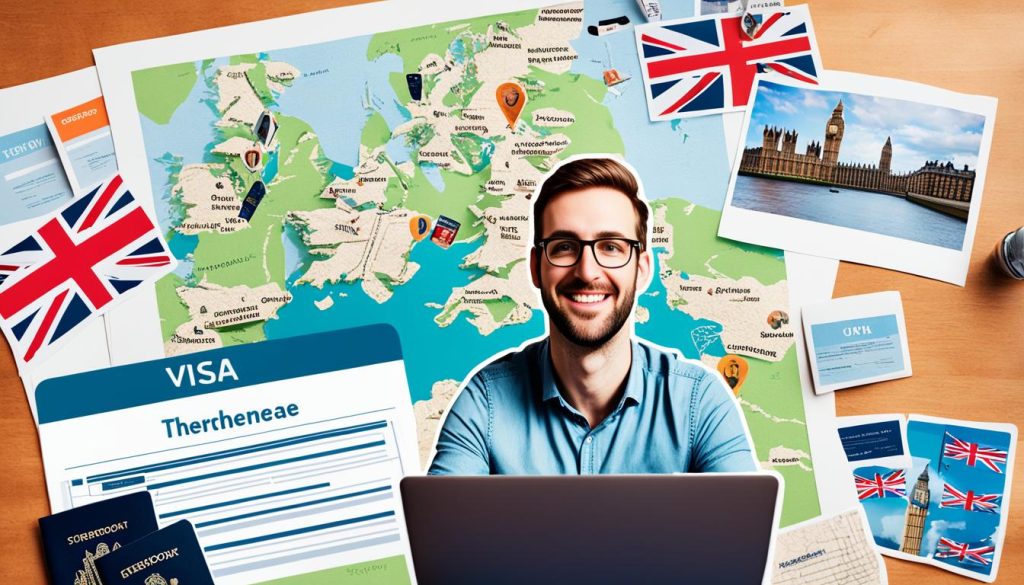
Are you in the UK for work, studying, or just to visit?
Sometimes you may need to stay longer than you first thought. When this happens, you must know how to legally extend or renew your visa. It’s also possible you might want to change your visa type if your situation changes.
Renewal and Long-term Stay Considerations
Extending your current UK visa takes a few key steps. First, make sure you’re eligible to extend your visa.
You should start this process before your current visa runs out. It’s vital to have the most recent documents that show why you need to stay.
- Review the eligibility requirements for your specific visa category.
- Prepare the necessary supporting documents, such as proof of ongoing employment or study.
- Submit your application online through the UK Visa and Immigration website.
- Pay the required visa extension fee and, if applicable, the healthcare surcharge.
- Schedule and attend an appointment at an approved visa application centre, if required.
Switching Visa Categories
Sometimes, you might need to change your visa type, for instance, from a student to a work visa.
Switching is allowed but follows strict rules.
- Identify the new visa category that aligns with your intentions, such as a work or family visa.
- Ensure you meet the criteria for the new visa, including any financial, health, and character requirements.
- Complete the necessary application forms, which will be determined by the visa you are switching to.
- Compile any required documentation, akin to a new visa application.
- Submit your application from within the UK and wait for the decision.
Whether you’re extending your visa, renewing it, or changing types, staying current with UK Visa and Immigration rules is vital.
Following the rules and timelines closely ensures your UK stay is lawful.
Healthcare Access for UK Visa Holders
Planning your trip to the United Kingdom includes knowing how to get medical care. As a visa holder, you will need to pay an immigration health surcharge. This payment is necessary for most visas and is on top of the visa application fee.
NHS Coverage for Immigrants
From the moment you land in the UK, NHS access is there for visa holders. It covers doctor visits, hospital stays, and certain dental services. But, remember that some treatments and medicines might cost extra.
Healthcare Surcharge Details
Paying the immigration health surcharge helps keep the NHS running well. The fee varies with the visa type and stay length. Thinking about this cost is important as it affects your NHS access rights.
- Find out the exact surcharge for your visa.
- Add this payment to your visa application steps.
- Pay on time to ensure your NHS access in the UK is not delayed.
The Role of Visa Sponsors in the UK
Visa sponsorship is a big deal in the UK’s immigration world. If someone wants to sponsor a visitor, they take on a big responsibility. They promise to help with the person’s visa application and stay in the UK. Let’s look at what sponsors need to do and what documents they must have.
Responsibilities of a UK Visa Sponsor
Being a sponsor means more than just helping out. It’s about making sure the person you’re sponsoring follows the UK’s visa rules. Sponsors have to keep the right records and give the right support during the visitor’s stay.
- Ensuring the visitor does not breach any immigration rules
- Obligation to notify the authorities if circumstances change
- Responsibility to provide financial support if necessary
- Requirement to assist with accommodation and basic needs
Documentation for Sponsoring a Visitor
Good sponsor documentation is key for a smooth sponsorship. To apply for a visa, a sponsor must show they’re ready and able to help. Here are some documents they might need:
- Valid identification or passport proving UK residence or citizenship
- Proof of adequate finances or bank statements
- Evidence of sufficient living accommodation
- Employment details or business credentials, if applicable
- Letter of invitation, detailing the purpose of the visit and the sponsor’s commitment
Sponsors have to be thorough to make their visitor’s application strong. They must meet several requirements and prepare all documents carefully. This is crucial for a smooth visa process.
Permanent Residency and Naturalisation Options
Moving from temporary to settled status is common for many in the UK. This journey includes looking into permanent residency in the UK and UK citizenship. Both offer benefits like healthcare, education, and no need for visa renewals.
Indefinite Leave to Remain (ILR)
Getting Indefinite Leave to Remain (ILR) is crucial for those wanting to stay in the UK permanently. It means you don’t need to follow immigration rules anymore, and it’s needed to become a citizen. To apply, one must live in the UK for some time, have no criminal record, and know English plus UK life basics.
- You often need 5 years of living in the UK in the right category.
- Passing the ‘Life in the UK’ test shows you understand British culture and history.
- With ILR, you can leave and come back to the UK with ease.
The Journey to UK Citizenship
Though ILR is stable, becoming a UK citizen means fully joining in the country’s civic life. This grants a British passport and total participation rights. Typically, you need ILR for a year, to stay in the UK, and prove your English skills and UK knowledge again.
- Show you’re dedicated to living in the UK.
- Good character is key; even small legal issues can interfere.
- Fulfill the citizenship application steps, including a ceremony.
Seeking permanent residency in the UK or UK citizenship is a big decision, offering safety and belonging. While it takes effort and understanding, achieving this goal is possible for those who see the UK as their home.
Conclusion
Getting a UK visa might seem tough at first. But, our UK visa guide has all the details you need. It helps you understand what’s needed for a successful application. It’s key to pick the right visa category and get your documents ready.
Our guide shines a light on important tips for your visa application. It’s crucial to meet all requirements, no matter the visa type. Being meticulous and persistent is vital for success.
To wrap up, getting your UK visa takes effort and attention. Use our guide wisely to improve your chances. We aim to make the visa process clearer. Good luck with your application and enjoy your time in the UK.

